Evaluating Recovery-Oriented Practices in Health Services
VerifiedAdded on 2020/07/22
|13
|4143
|41
Report
AI Summary
The report delves into the intricacies of person-centered care within healthcare management, highlighting the significance of integrating patient-centered practices to achieve health equity. By examining key themes such as patient activation, team-based care, mental health policy reforms, and recovery-oriented approaches, this study underscores their role in improving health outcomes and addressing disparities. It draws on various sources to present comprehensive insights into the challenges and opportunities within modern healthcare systems. Furthermore, it outlines actionable strategies for enhancing service delivery through effective collaboration among stakeholders. The findings emphasize the need for a systemic shift towards holistic, patient-focused care models that prioritize individual needs while fostering equitable access to health services.
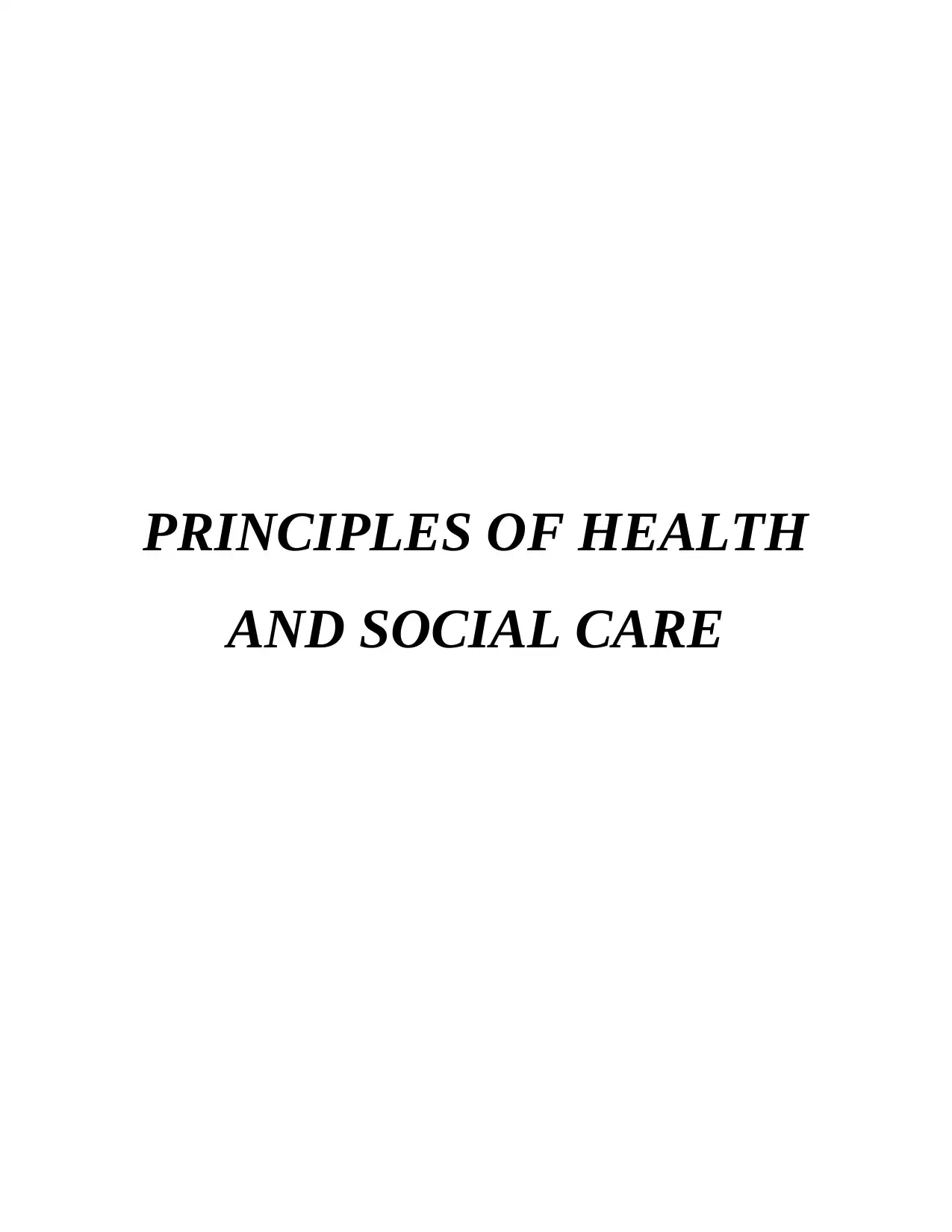
PRINCIPLES OF HEALTH
AND SOCIAL CARE
AND SOCIAL CARE
Paraphrase This Document
Need a fresh take? Get an instant paraphrase of this document with our AI Paraphraser
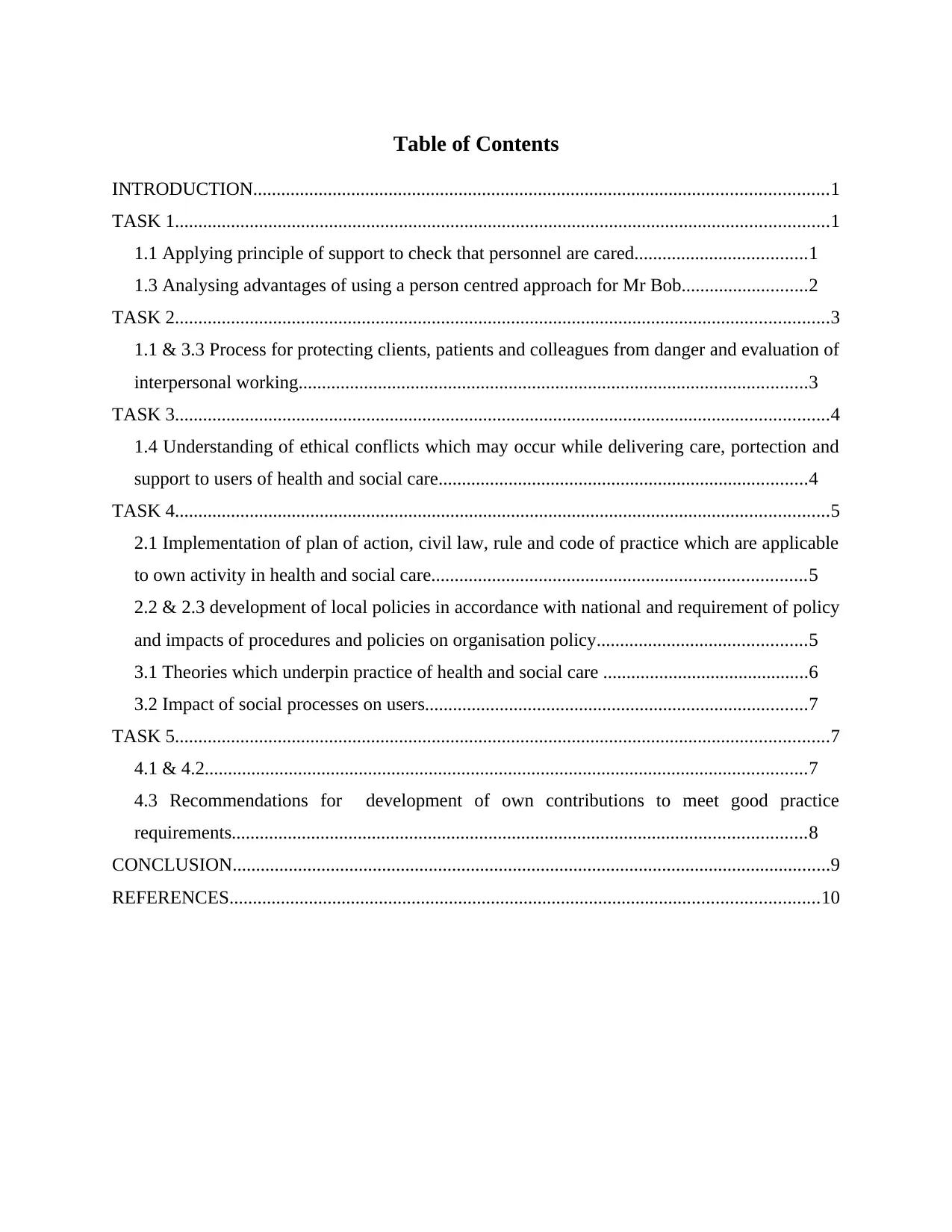
Table of Contents
INTRODUCTION...........................................................................................................................1
TASK 1............................................................................................................................................1
1.1 Applying principle of support to check that personnel are cared.....................................1
1.3 Analysing advantages of using a person centred approach for Mr Bob...........................2
TASK 2............................................................................................................................................3
1.1 & 3.3 Process for protecting clients, patients and colleagues from danger and evaluation of
interpersonal working.............................................................................................................3
TASK 3............................................................................................................................................4
1.4 Understanding of ethical conflicts which may occur while delivering care, portection and
support to users of health and social care...............................................................................4
TASK 4............................................................................................................................................5
2.1 Implementation of plan of action, civil law, rule and code of practice which are applicable
to own activity in health and social care................................................................................5
2.2 & 2.3 development of local policies in accordance with national and requirement of policy
and impacts of procedures and policies on organisation policy.............................................5
3.1 Theories which underpin practice of health and social care ............................................6
3.2 Impact of social processes on users..................................................................................7
TASK 5............................................................................................................................................7
4.1 & 4.2.................................................................................................................................7
4.3 Recommendations for development of own contributions to meet good practice
requirements...........................................................................................................................8
CONCLUSION................................................................................................................................9
REFERENCES..............................................................................................................................10
INTRODUCTION...........................................................................................................................1
TASK 1............................................................................................................................................1
1.1 Applying principle of support to check that personnel are cared.....................................1
1.3 Analysing advantages of using a person centred approach for Mr Bob...........................2
TASK 2............................................................................................................................................3
1.1 & 3.3 Process for protecting clients, patients and colleagues from danger and evaluation of
interpersonal working.............................................................................................................3
TASK 3............................................................................................................................................4
1.4 Understanding of ethical conflicts which may occur while delivering care, portection and
support to users of health and social care...............................................................................4
TASK 4............................................................................................................................................5
2.1 Implementation of plan of action, civil law, rule and code of practice which are applicable
to own activity in health and social care................................................................................5
2.2 & 2.3 development of local policies in accordance with national and requirement of policy
and impacts of procedures and policies on organisation policy.............................................5
3.1 Theories which underpin practice of health and social care ............................................6
3.2 Impact of social processes on users..................................................................................7
TASK 5............................................................................................................................................7
4.1 & 4.2.................................................................................................................................7
4.3 Recommendations for development of own contributions to meet good practice
requirements...........................................................................................................................8
CONCLUSION................................................................................................................................9
REFERENCES..............................................................................................................................10
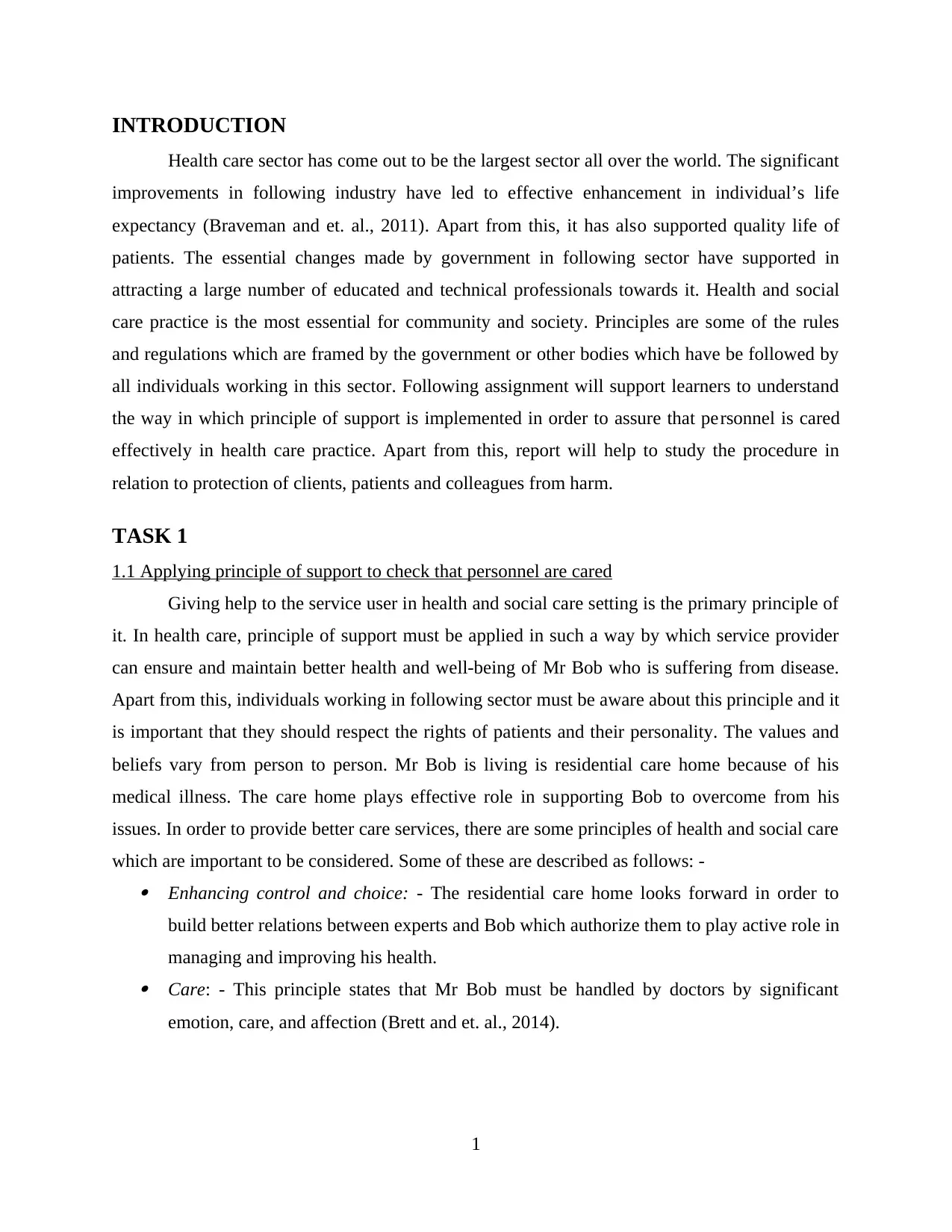
INTRODUCTION
Health care sector has come out to be the largest sector all over the world. The significant
improvements in following industry have led to effective enhancement in individual’s life
expectancy (Braveman and et. al., 2011). Apart from this, it has also supported quality life of
patients. The essential changes made by government in following sector have supported in
attracting a large number of educated and technical professionals towards it. Health and social
care practice is the most essential for community and society. Principles are some of the rules
and regulations which are framed by the government or other bodies which have be followed by
all individuals working in this sector. Following assignment will support learners to understand
the way in which principle of support is implemented in order to assure that personnel is cared
effectively in health care practice. Apart from this, report will help to study the procedure in
relation to protection of clients, patients and colleagues from harm.
TASK 1
1.1 Applying principle of support to check that personnel are cared
Giving help to the service user in health and social care setting is the primary principle of
it. In health care, principle of support must be applied in such a way by which service provider
can ensure and maintain better health and well-being of Mr Bob who is suffering from disease.
Apart from this, individuals working in following sector must be aware about this principle and it
is important that they should respect the rights of patients and their personality. The values and
beliefs vary from person to person. Mr Bob is living is residential care home because of his
medical illness. The care home plays effective role in supporting Bob to overcome from his
issues. In order to provide better care services, there are some principles of health and social care
which are important to be considered. Some of these are described as follows: - Enhancing control and choice: - The residential care home looks forward in order to
build better relations between experts and Bob which authorize them to play active role in
managing and improving his health. Care: - This principle states that Mr Bob must be handled by doctors by significant
emotion, care, and affection (Brett and et. al., 2014).
1
Health care sector has come out to be the largest sector all over the world. The significant
improvements in following industry have led to effective enhancement in individual’s life
expectancy (Braveman and et. al., 2011). Apart from this, it has also supported quality life of
patients. The essential changes made by government in following sector have supported in
attracting a large number of educated and technical professionals towards it. Health and social
care practice is the most essential for community and society. Principles are some of the rules
and regulations which are framed by the government or other bodies which have be followed by
all individuals working in this sector. Following assignment will support learners to understand
the way in which principle of support is implemented in order to assure that personnel is cared
effectively in health care practice. Apart from this, report will help to study the procedure in
relation to protection of clients, patients and colleagues from harm.
TASK 1
1.1 Applying principle of support to check that personnel are cared
Giving help to the service user in health and social care setting is the primary principle of
it. In health care, principle of support must be applied in such a way by which service provider
can ensure and maintain better health and well-being of Mr Bob who is suffering from disease.
Apart from this, individuals working in following sector must be aware about this principle and it
is important that they should respect the rights of patients and their personality. The values and
beliefs vary from person to person. Mr Bob is living is residential care home because of his
medical illness. The care home plays effective role in supporting Bob to overcome from his
issues. In order to provide better care services, there are some principles of health and social care
which are important to be considered. Some of these are described as follows: - Enhancing control and choice: - The residential care home looks forward in order to
build better relations between experts and Bob which authorize them to play active role in
managing and improving his health. Care: - This principle states that Mr Bob must be handled by doctors by significant
emotion, care, and affection (Brett and et. al., 2014).
1
⊘ This is a preview!⊘
Do you want full access?
Subscribe today to unlock all pages.

Trusted by 1+ million students worldwide
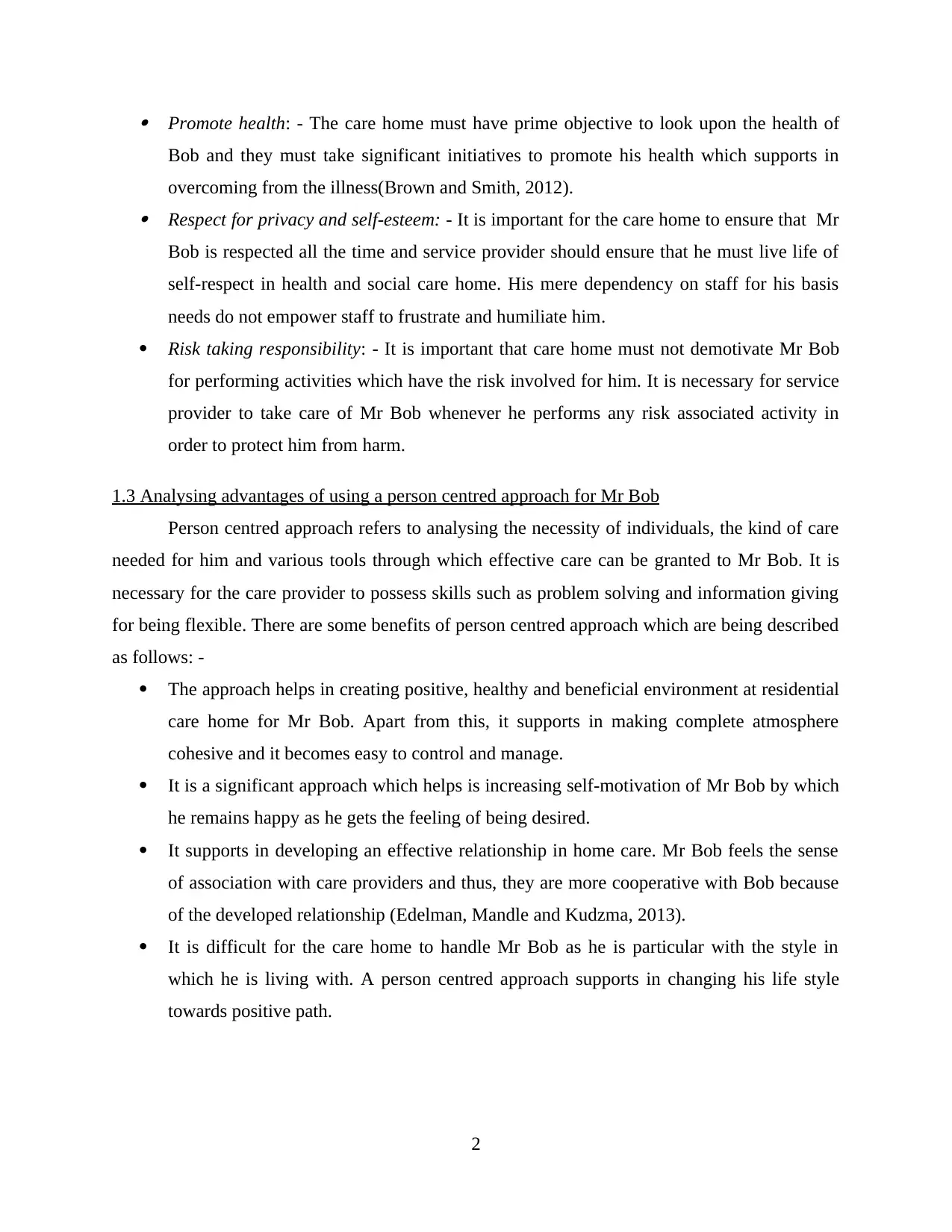
Promote health: - The care home must have prime objective to look upon the health of
Bob and they must take significant initiatives to promote his health which supports in
overcoming from the illness(Brown and Smith, 2012). Respect for privacy and self-esteem: - It is important for the care home to ensure that Mr
Bob is respected all the time and service provider should ensure that he must live life of
self-respect in health and social care home. His mere dependency on staff for his basis
needs do not empower staff to frustrate and humiliate him.
Risk taking responsibility: - It is important that care home must not demotivate Mr Bob
for performing activities which have the risk involved for him. It is necessary for service
provider to take care of Mr Bob whenever he performs any risk associated activity in
order to protect him from harm.
1.3 Analysing advantages of using a person centred approach for Mr Bob
Person centred approach refers to analysing the necessity of individuals, the kind of care
needed for him and various tools through which effective care can be granted to Mr Bob. It is
necessary for the care provider to possess skills such as problem solving and information giving
for being flexible. There are some benefits of person centred approach which are being described
as follows: -
The approach helps in creating positive, healthy and beneficial environment at residential
care home for Mr Bob. Apart from this, it supports in making complete atmosphere
cohesive and it becomes easy to control and manage.
It is a significant approach which helps is increasing self-motivation of Mr Bob by which
he remains happy as he gets the feeling of being desired.
It supports in developing an effective relationship in home care. Mr Bob feels the sense
of association with care providers and thus, they are more cooperative with Bob because
of the developed relationship (Edelman, Mandle and Kudzma, 2013).
It is difficult for the care home to handle Mr Bob as he is particular with the style in
which he is living with. A person centred approach supports in changing his life style
towards positive path.
2
Bob and they must take significant initiatives to promote his health which supports in
overcoming from the illness(Brown and Smith, 2012). Respect for privacy and self-esteem: - It is important for the care home to ensure that Mr
Bob is respected all the time and service provider should ensure that he must live life of
self-respect in health and social care home. His mere dependency on staff for his basis
needs do not empower staff to frustrate and humiliate him.
Risk taking responsibility: - It is important that care home must not demotivate Mr Bob
for performing activities which have the risk involved for him. It is necessary for service
provider to take care of Mr Bob whenever he performs any risk associated activity in
order to protect him from harm.
1.3 Analysing advantages of using a person centred approach for Mr Bob
Person centred approach refers to analysing the necessity of individuals, the kind of care
needed for him and various tools through which effective care can be granted to Mr Bob. It is
necessary for the care provider to possess skills such as problem solving and information giving
for being flexible. There are some benefits of person centred approach which are being described
as follows: -
The approach helps in creating positive, healthy and beneficial environment at residential
care home for Mr Bob. Apart from this, it supports in making complete atmosphere
cohesive and it becomes easy to control and manage.
It is a significant approach which helps is increasing self-motivation of Mr Bob by which
he remains happy as he gets the feeling of being desired.
It supports in developing an effective relationship in home care. Mr Bob feels the sense
of association with care providers and thus, they are more cooperative with Bob because
of the developed relationship (Edelman, Mandle and Kudzma, 2013).
It is difficult for the care home to handle Mr Bob as he is particular with the style in
which he is living with. A person centred approach supports in changing his life style
towards positive path.
2
Paraphrase This Document
Need a fresh take? Get an instant paraphrase of this document with our AI Paraphraser
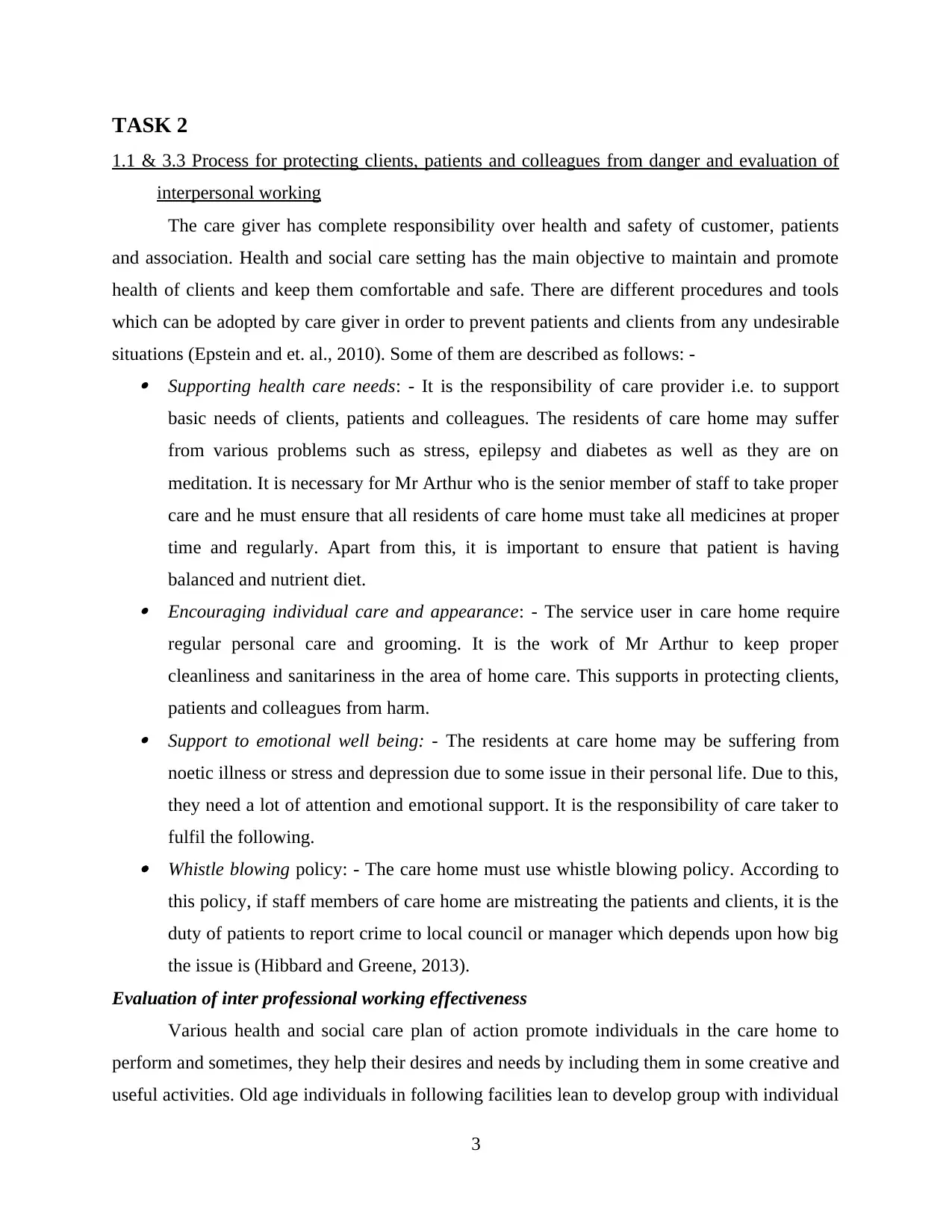
TASK 2
1.1 & 3.3 Process for protecting clients, patients and colleagues from danger and evaluation of
interpersonal working
The care giver has complete responsibility over health and safety of customer, patients
and association. Health and social care setting has the main objective to maintain and promote
health of clients and keep them comfortable and safe. There are different procedures and tools
which can be adopted by care giver in order to prevent patients and clients from any undesirable
situations (Epstein and et. al., 2010). Some of them are described as follows: - Supporting health care needs: - It is the responsibility of care provider i.e. to support
basic needs of clients, patients and colleagues. The residents of care home may suffer
from various problems such as stress, epilepsy and diabetes as well as they are on
meditation. It is necessary for Mr Arthur who is the senior member of staff to take proper
care and he must ensure that all residents of care home must take all medicines at proper
time and regularly. Apart from this, it is important to ensure that patient is having
balanced and nutrient diet. Encouraging individual care and appearance: - The service user in care home require
regular personal care and grooming. It is the work of Mr Arthur to keep proper
cleanliness and sanitariness in the area of home care. This supports in protecting clients,
patients and colleagues from harm. Support to emotional well being: - The residents at care home may be suffering from
noetic illness or stress and depression due to some issue in their personal life. Due to this,
they need a lot of attention and emotional support. It is the responsibility of care taker to
fulfil the following. Whistle blowing policy: - The care home must use whistle blowing policy. According to
this policy, if staff members of care home are mistreating the patients and clients, it is the
duty of patients to report crime to local council or manager which depends upon how big
the issue is (Hibbard and Greene, 2013).
Evaluation of inter professional working effectiveness
Various health and social care plan of action promote individuals in the care home to
perform and sometimes, they help their desires and needs by including them in some creative and
useful activities. Old age individuals in following facilities lean to develop group with individual
3
1.1 & 3.3 Process for protecting clients, patients and colleagues from danger and evaluation of
interpersonal working
The care giver has complete responsibility over health and safety of customer, patients
and association. Health and social care setting has the main objective to maintain and promote
health of clients and keep them comfortable and safe. There are different procedures and tools
which can be adopted by care giver in order to prevent patients and clients from any undesirable
situations (Epstein and et. al., 2010). Some of them are described as follows: - Supporting health care needs: - It is the responsibility of care provider i.e. to support
basic needs of clients, patients and colleagues. The residents of care home may suffer
from various problems such as stress, epilepsy and diabetes as well as they are on
meditation. It is necessary for Mr Arthur who is the senior member of staff to take proper
care and he must ensure that all residents of care home must take all medicines at proper
time and regularly. Apart from this, it is important to ensure that patient is having
balanced and nutrient diet. Encouraging individual care and appearance: - The service user in care home require
regular personal care and grooming. It is the work of Mr Arthur to keep proper
cleanliness and sanitariness in the area of home care. This supports in protecting clients,
patients and colleagues from harm. Support to emotional well being: - The residents at care home may be suffering from
noetic illness or stress and depression due to some issue in their personal life. Due to this,
they need a lot of attention and emotional support. It is the responsibility of care taker to
fulfil the following. Whistle blowing policy: - The care home must use whistle blowing policy. According to
this policy, if staff members of care home are mistreating the patients and clients, it is the
duty of patients to report crime to local council or manager which depends upon how big
the issue is (Hibbard and Greene, 2013).
Evaluation of inter professional working effectiveness
Various health and social care plan of action promote individuals in the care home to
perform and sometimes, they help their desires and needs by including them in some creative and
useful activities. Old age individuals in following facilities lean to develop group with individual
3
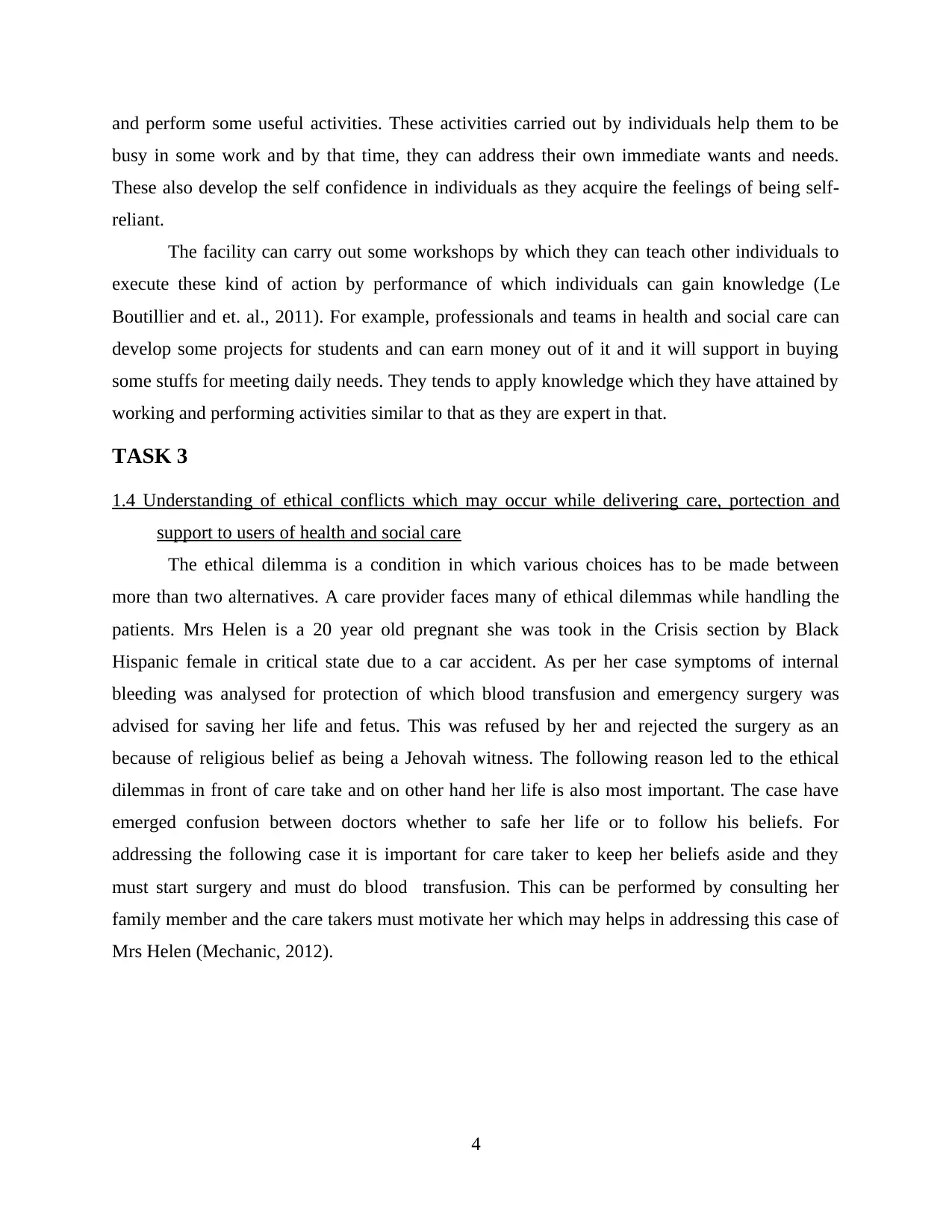
and perform some useful activities. These activities carried out by individuals help them to be
busy in some work and by that time, they can address their own immediate wants and needs.
These also develop the self confidence in individuals as they acquire the feelings of being self-
reliant.
The facility can carry out some workshops by which they can teach other individuals to
execute these kind of action by performance of which individuals can gain knowledge (Le
Boutillier and et. al., 2011). For example, professionals and teams in health and social care can
develop some projects for students and can earn money out of it and it will support in buying
some stuffs for meeting daily needs. They tends to apply knowledge which they have attained by
working and performing activities similar to that as they are expert in that.
TASK 3
1.4 Understanding of ethical conflicts which may occur while delivering care, portection and
support to users of health and social care
The ethical dilemma is a condition in which various choices has to be made between
more than two alternatives. A care provider faces many of ethical dilemmas while handling the
patients. Mrs Helen is a 20 year old pregnant she was took in the Crisis section by Black
Hispanic female in critical state due to a car accident. As per her case symptoms of internal
bleeding was analysed for protection of which blood transfusion and emergency surgery was
advised for saving her life and fetus. This was refused by her and rejected the surgery as an
because of religious belief as being a Jehovah witness. The following reason led to the ethical
dilemmas in front of care take and on other hand her life is also most important. The case have
emerged confusion between doctors whether to safe her life or to follow his beliefs. For
addressing the following case it is important for care taker to keep her beliefs aside and they
must start surgery and must do blood transfusion. This can be performed by consulting her
family member and the care takers must motivate her which may helps in addressing this case of
Mrs Helen (Mechanic, 2012).
4
busy in some work and by that time, they can address their own immediate wants and needs.
These also develop the self confidence in individuals as they acquire the feelings of being self-
reliant.
The facility can carry out some workshops by which they can teach other individuals to
execute these kind of action by performance of which individuals can gain knowledge (Le
Boutillier and et. al., 2011). For example, professionals and teams in health and social care can
develop some projects for students and can earn money out of it and it will support in buying
some stuffs for meeting daily needs. They tends to apply knowledge which they have attained by
working and performing activities similar to that as they are expert in that.
TASK 3
1.4 Understanding of ethical conflicts which may occur while delivering care, portection and
support to users of health and social care
The ethical dilemma is a condition in which various choices has to be made between
more than two alternatives. A care provider faces many of ethical dilemmas while handling the
patients. Mrs Helen is a 20 year old pregnant she was took in the Crisis section by Black
Hispanic female in critical state due to a car accident. As per her case symptoms of internal
bleeding was analysed for protection of which blood transfusion and emergency surgery was
advised for saving her life and fetus. This was refused by her and rejected the surgery as an
because of religious belief as being a Jehovah witness. The following reason led to the ethical
dilemmas in front of care take and on other hand her life is also most important. The case have
emerged confusion between doctors whether to safe her life or to follow his beliefs. For
addressing the following case it is important for care taker to keep her beliefs aside and they
must start surgery and must do blood transfusion. This can be performed by consulting her
family member and the care takers must motivate her which may helps in addressing this case of
Mrs Helen (Mechanic, 2012).
4
⊘ This is a preview!⊘
Do you want full access?
Subscribe today to unlock all pages.

Trusted by 1+ million students worldwide
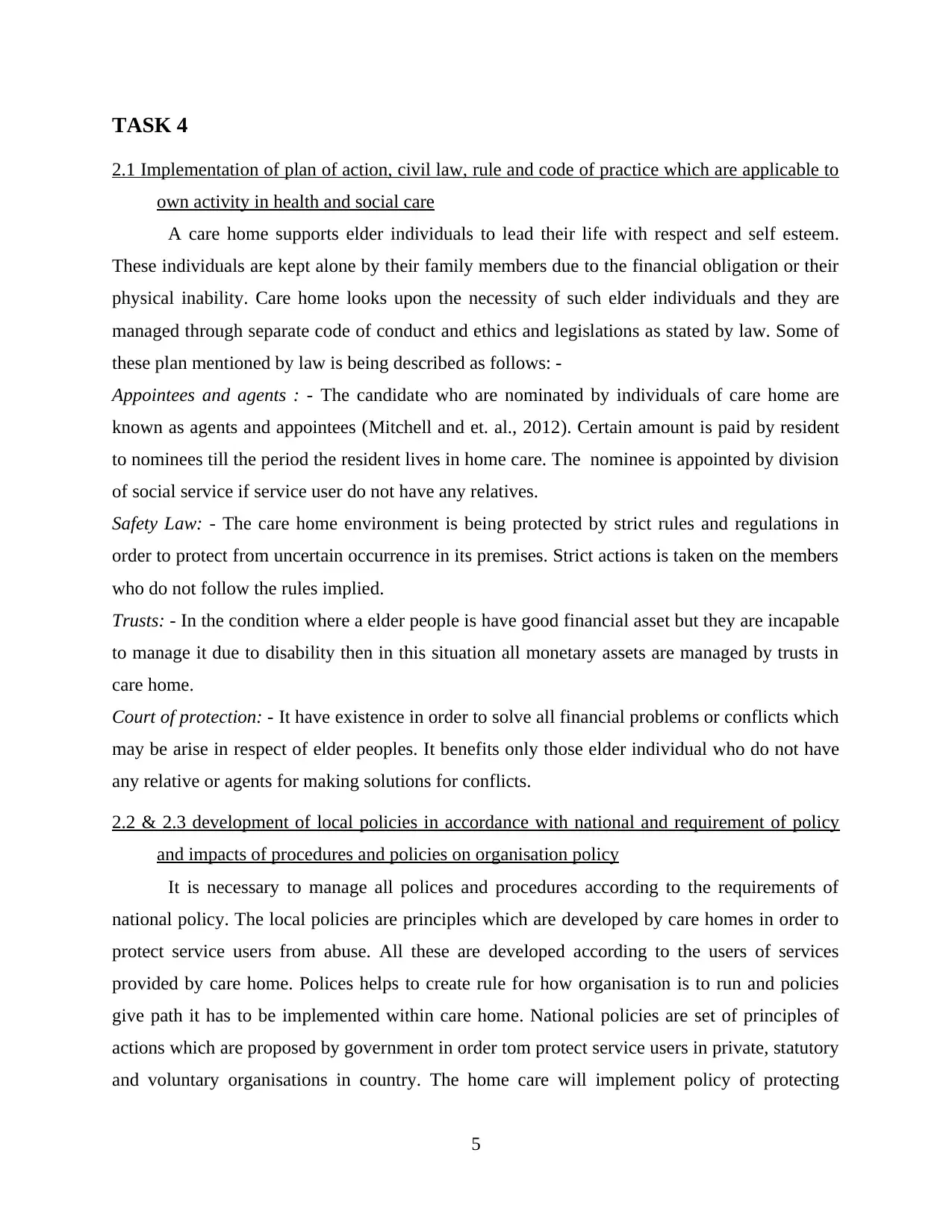
TASK 4
2.1 Implementation of plan of action, civil law, rule and code of practice which are applicable to
own activity in health and social care
A care home supports elder individuals to lead their life with respect and self esteem.
These individuals are kept alone by their family members due to the financial obligation or their
physical inability. Care home looks upon the necessity of such elder individuals and they are
managed through separate code of conduct and ethics and legislations as stated by law. Some of
these plan mentioned by law is being described as follows: -
Appointees and agents : - The candidate who are nominated by individuals of care home are
known as agents and appointees (Mitchell and et. al., 2012). Certain amount is paid by resident
to nominees till the period the resident lives in home care. The nominee is appointed by division
of social service if service user do not have any relatives.
Safety Law: - The care home environment is being protected by strict rules and regulations in
order to protect from uncertain occurrence in its premises. Strict actions is taken on the members
who do not follow the rules implied.
Trusts: - In the condition where a elder people is have good financial asset but they are incapable
to manage it due to disability then in this situation all monetary assets are managed by trusts in
care home.
Court of protection: - It have existence in order to solve all financial problems or conflicts which
may be arise in respect of elder peoples. It benefits only those elder individual who do not have
any relative or agents for making solutions for conflicts.
2.2 & 2.3 development of local policies in accordance with national and requirement of policy
and impacts of procedures and policies on organisation policy
It is necessary to manage all polices and procedures according to the requirements of
national policy. The local policies are principles which are developed by care homes in order to
protect service users from abuse. All these are developed according to the users of services
provided by care home. Polices helps to create rule for how organisation is to run and policies
give path it has to be implemented within care home. National policies are set of principles of
actions which are proposed by government in order tom protect service users in private, statutory
and voluntary organisations in country. The home care will implement policy of protecting
5
2.1 Implementation of plan of action, civil law, rule and code of practice which are applicable to
own activity in health and social care
A care home supports elder individuals to lead their life with respect and self esteem.
These individuals are kept alone by their family members due to the financial obligation or their
physical inability. Care home looks upon the necessity of such elder individuals and they are
managed through separate code of conduct and ethics and legislations as stated by law. Some of
these plan mentioned by law is being described as follows: -
Appointees and agents : - The candidate who are nominated by individuals of care home are
known as agents and appointees (Mitchell and et. al., 2012). Certain amount is paid by resident
to nominees till the period the resident lives in home care. The nominee is appointed by division
of social service if service user do not have any relatives.
Safety Law: - The care home environment is being protected by strict rules and regulations in
order to protect from uncertain occurrence in its premises. Strict actions is taken on the members
who do not follow the rules implied.
Trusts: - In the condition where a elder people is have good financial asset but they are incapable
to manage it due to disability then in this situation all monetary assets are managed by trusts in
care home.
Court of protection: - It have existence in order to solve all financial problems or conflicts which
may be arise in respect of elder peoples. It benefits only those elder individual who do not have
any relative or agents for making solutions for conflicts.
2.2 & 2.3 development of local policies in accordance with national and requirement of policy
and impacts of procedures and policies on organisation policy
It is necessary to manage all polices and procedures according to the requirements of
national policy. The local policies are principles which are developed by care homes in order to
protect service users from abuse. All these are developed according to the users of services
provided by care home. Polices helps to create rule for how organisation is to run and policies
give path it has to be implemented within care home. National policies are set of principles of
actions which are proposed by government in order tom protect service users in private, statutory
and voluntary organisations in country. The home care will implement policy of protecting
5
Paraphrase This Document
Need a fresh take? Get an instant paraphrase of this document with our AI Paraphraser
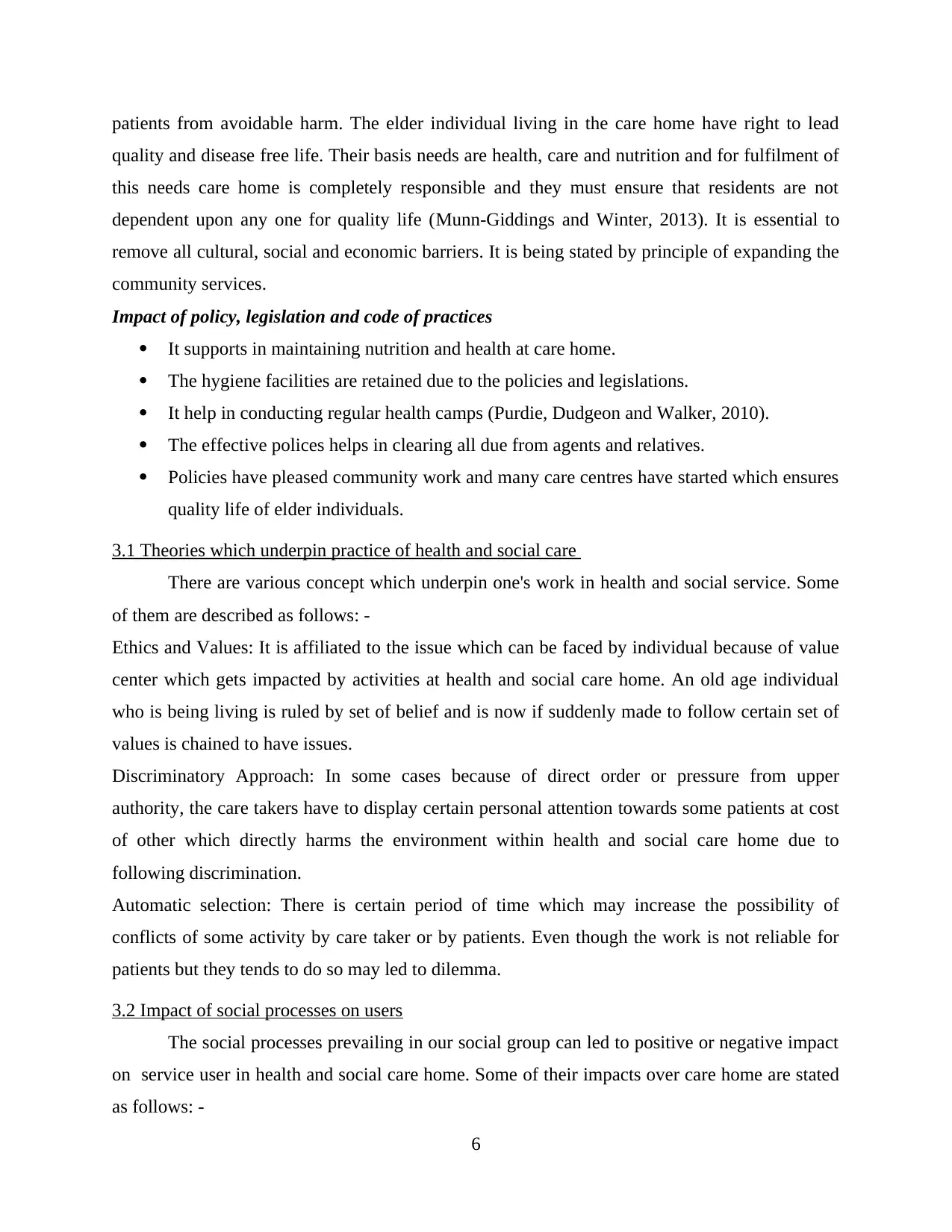
patients from avoidable harm. The elder individual living in the care home have right to lead
quality and disease free life. Their basis needs are health, care and nutrition and for fulfilment of
this needs care home is completely responsible and they must ensure that residents are not
dependent upon any one for quality life (Munn-Giddings and Winter, 2013). It is essential to
remove all cultural, social and economic barriers. It is being stated by principle of expanding the
community services.
Impact of policy, legislation and code of practices
It supports in maintaining nutrition and health at care home.
The hygiene facilities are retained due to the policies and legislations.
It help in conducting regular health camps (Purdie, Dudgeon and Walker, 2010).
The effective polices helps in clearing all due from agents and relatives.
Policies have pleased community work and many care centres have started which ensures
quality life of elder individuals.
3.1 Theories which underpin practice of health and social care
There are various concept which underpin one's work in health and social service. Some
of them are described as follows: -
Ethics and Values: It is affiliated to the issue which can be faced by individual because of value
center which gets impacted by activities at health and social care home. An old age individual
who is being living is ruled by set of belief and is now if suddenly made to follow certain set of
values is chained to have issues.
Discriminatory Approach: In some cases because of direct order or pressure from upper
authority, the care takers have to display certain personal attention towards some patients at cost
of other which directly harms the environment within health and social care home due to
following discrimination.
Automatic selection: There is certain period of time which may increase the possibility of
conflicts of some activity by care taker or by patients. Even though the work is not reliable for
patients but they tends to do so may led to dilemma.
3.2 Impact of social processes on users
The social processes prevailing in our social group can led to positive or negative impact
on service user in health and social care home. Some of their impacts over care home are stated
as follows: -
6
quality and disease free life. Their basis needs are health, care and nutrition and for fulfilment of
this needs care home is completely responsible and they must ensure that residents are not
dependent upon any one for quality life (Munn-Giddings and Winter, 2013). It is essential to
remove all cultural, social and economic barriers. It is being stated by principle of expanding the
community services.
Impact of policy, legislation and code of practices
It supports in maintaining nutrition and health at care home.
The hygiene facilities are retained due to the policies and legislations.
It help in conducting regular health camps (Purdie, Dudgeon and Walker, 2010).
The effective polices helps in clearing all due from agents and relatives.
Policies have pleased community work and many care centres have started which ensures
quality life of elder individuals.
3.1 Theories which underpin practice of health and social care
There are various concept which underpin one's work in health and social service. Some
of them are described as follows: -
Ethics and Values: It is affiliated to the issue which can be faced by individual because of value
center which gets impacted by activities at health and social care home. An old age individual
who is being living is ruled by set of belief and is now if suddenly made to follow certain set of
values is chained to have issues.
Discriminatory Approach: In some cases because of direct order or pressure from upper
authority, the care takers have to display certain personal attention towards some patients at cost
of other which directly harms the environment within health and social care home due to
following discrimination.
Automatic selection: There is certain period of time which may increase the possibility of
conflicts of some activity by care taker or by patients. Even though the work is not reliable for
patients but they tends to do so may led to dilemma.
3.2 Impact of social processes on users
The social processes prevailing in our social group can led to positive or negative impact
on service user in health and social care home. Some of their impacts over care home are stated
as follows: -
6
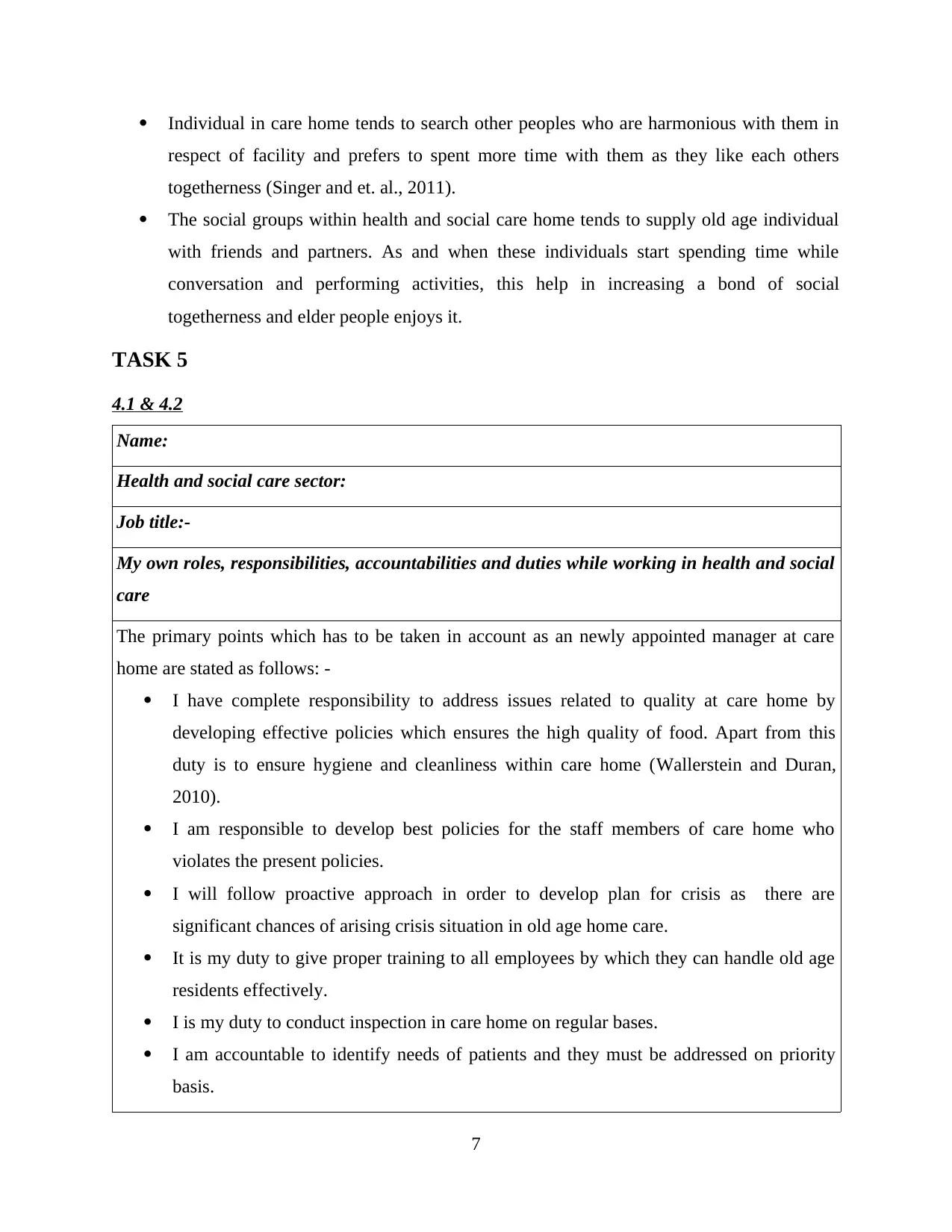
Individual in care home tends to search other peoples who are harmonious with them in
respect of facility and prefers to spent more time with them as they like each others
togetherness (Singer and et. al., 2011).
The social groups within health and social care home tends to supply old age individual
with friends and partners. As and when these individuals start spending time while
conversation and performing activities, this help in increasing a bond of social
togetherness and elder people enjoys it.
TASK 5
4.1 & 4.2
Name:
Health and social care sector:
Job title:-
My own roles, responsibilities, accountabilities and duties while working in health and social
care
The primary points which has to be taken in account as an newly appointed manager at care
home are stated as follows: -
I have complete responsibility to address issues related to quality at care home by
developing effective policies which ensures the high quality of food. Apart from this
duty is to ensure hygiene and cleanliness within care home (Wallerstein and Duran,
2010).
I am responsible to develop best policies for the staff members of care home who
violates the present policies.
I will follow proactive approach in order to develop plan for crisis as there are
significant chances of arising crisis situation in old age home care.
It is my duty to give proper training to all employees by which they can handle old age
residents effectively.
I is my duty to conduct inspection in care home on regular bases.
I am accountable to identify needs of patients and they must be addressed on priority
basis.
7
respect of facility and prefers to spent more time with them as they like each others
togetherness (Singer and et. al., 2011).
The social groups within health and social care home tends to supply old age individual
with friends and partners. As and when these individuals start spending time while
conversation and performing activities, this help in increasing a bond of social
togetherness and elder people enjoys it.
TASK 5
4.1 & 4.2
Name:
Health and social care sector:
Job title:-
My own roles, responsibilities, accountabilities and duties while working in health and social
care
The primary points which has to be taken in account as an newly appointed manager at care
home are stated as follows: -
I have complete responsibility to address issues related to quality at care home by
developing effective policies which ensures the high quality of food. Apart from this
duty is to ensure hygiene and cleanliness within care home (Wallerstein and Duran,
2010).
I am responsible to develop best policies for the staff members of care home who
violates the present policies.
I will follow proactive approach in order to develop plan for crisis as there are
significant chances of arising crisis situation in old age home care.
It is my duty to give proper training to all employees by which they can handle old age
residents effectively.
I is my duty to conduct inspection in care home on regular bases.
I am accountable to identify needs of patients and they must be addressed on priority
basis.
7
⊘ This is a preview!⊘
Do you want full access?
Subscribe today to unlock all pages.

Trusted by 1+ million students worldwide
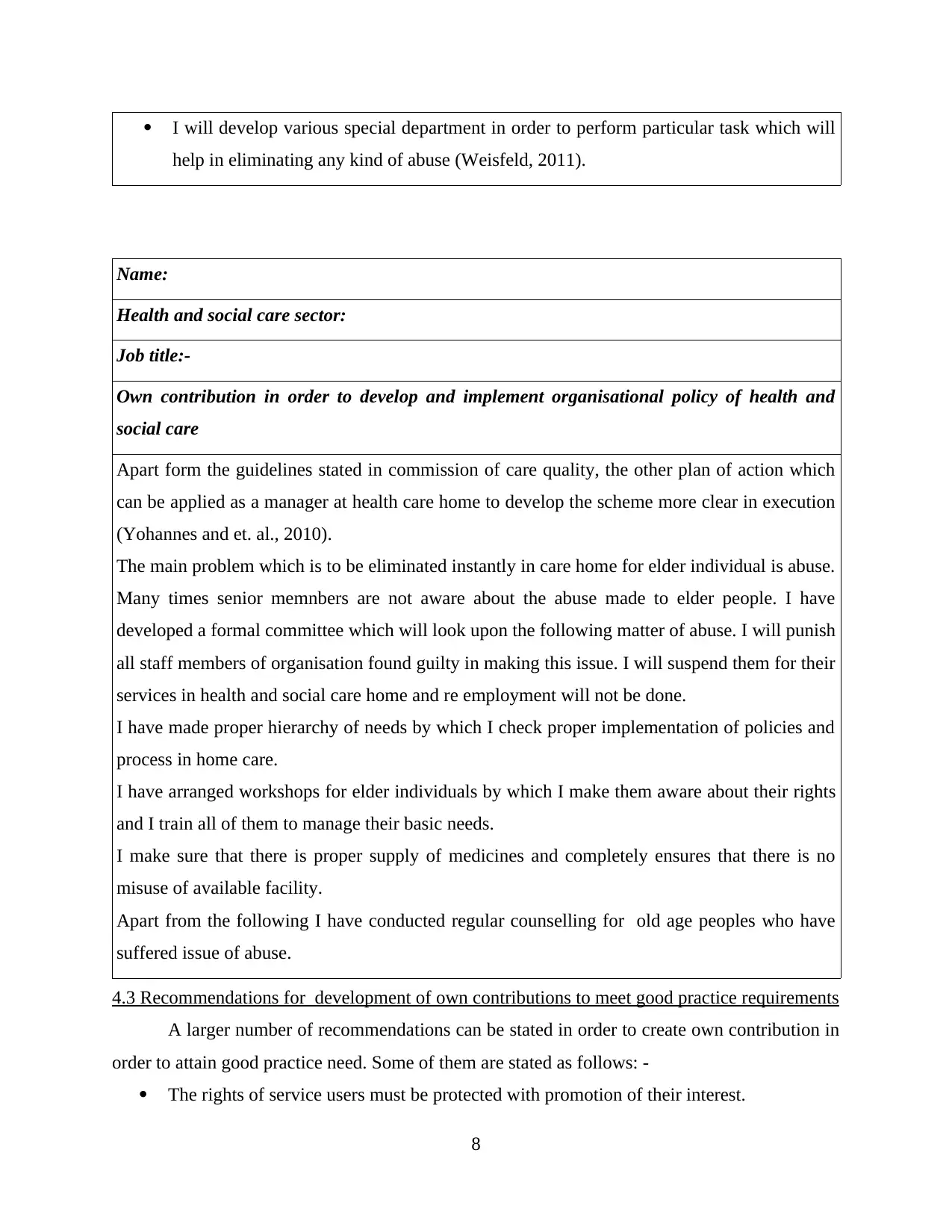
I will develop various special department in order to perform particular task which will
help in eliminating any kind of abuse (Weisfeld, 2011).
Name:
Health and social care sector:
Job title:-
Own contribution in order to develop and implement organisational policy of health and
social care
Apart form the guidelines stated in commission of care quality, the other plan of action which
can be applied as a manager at health care home to develop the scheme more clear in execution
(Yohannes and et. al., 2010).
The main problem which is to be eliminated instantly in care home for elder individual is abuse.
Many times senior memnbers are not aware about the abuse made to elder people. I have
developed a formal committee which will look upon the following matter of abuse. I will punish
all staff members of organisation found guilty in making this issue. I will suspend them for their
services in health and social care home and re employment will not be done.
I have made proper hierarchy of needs by which I check proper implementation of policies and
process in home care.
I have arranged workshops for elder individuals by which I make them aware about their rights
and I train all of them to manage their basic needs.
I make sure that there is proper supply of medicines and completely ensures that there is no
misuse of available facility.
Apart from the following I have conducted regular counselling for old age peoples who have
suffered issue of abuse.
4.3 Recommendations for development of own contributions to meet good practice requirements
A larger number of recommendations can be stated in order to create own contribution in
order to attain good practice need. Some of them are stated as follows: -
The rights of service users must be protected with promotion of their interest.
8
help in eliminating any kind of abuse (Weisfeld, 2011).
Name:
Health and social care sector:
Job title:-
Own contribution in order to develop and implement organisational policy of health and
social care
Apart form the guidelines stated in commission of care quality, the other plan of action which
can be applied as a manager at health care home to develop the scheme more clear in execution
(Yohannes and et. al., 2010).
The main problem which is to be eliminated instantly in care home for elder individual is abuse.
Many times senior memnbers are not aware about the abuse made to elder people. I have
developed a formal committee which will look upon the following matter of abuse. I will punish
all staff members of organisation found guilty in making this issue. I will suspend them for their
services in health and social care home and re employment will not be done.
I have made proper hierarchy of needs by which I check proper implementation of policies and
process in home care.
I have arranged workshops for elder individuals by which I make them aware about their rights
and I train all of them to manage their basic needs.
I make sure that there is proper supply of medicines and completely ensures that there is no
misuse of available facility.
Apart from the following I have conducted regular counselling for old age peoples who have
suffered issue of abuse.
4.3 Recommendations for development of own contributions to meet good practice requirements
A larger number of recommendations can be stated in order to create own contribution in
order to attain good practice need. Some of them are stated as follows: -
The rights of service users must be protected with promotion of their interest.
8
Paraphrase This Document
Need a fresh take? Get an instant paraphrase of this document with our AI Paraphraser
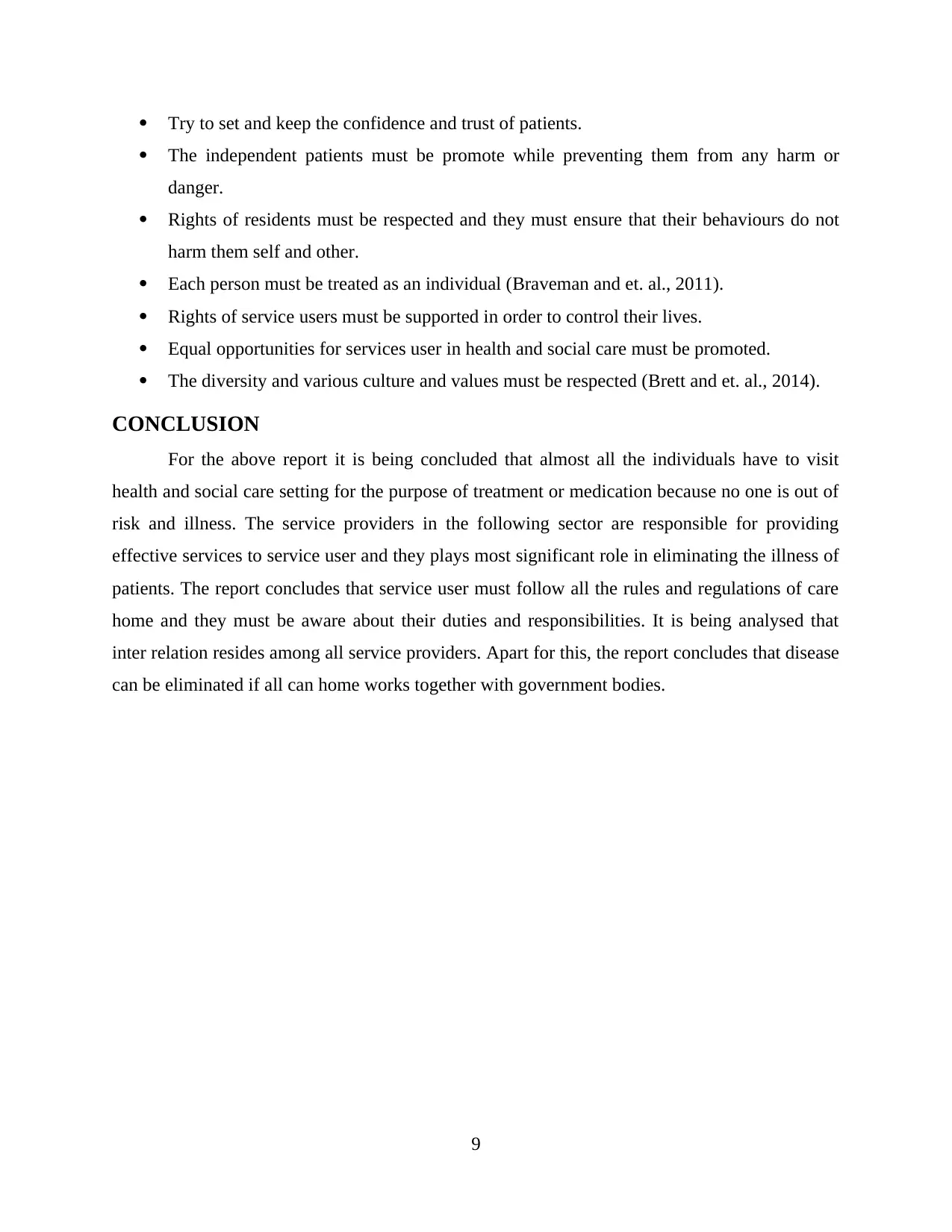
Try to set and keep the confidence and trust of patients.
The independent patients must be promote while preventing them from any harm or
danger.
Rights of residents must be respected and they must ensure that their behaviours do not
harm them self and other.
Each person must be treated as an individual (Braveman and et. al., 2011).
Rights of service users must be supported in order to control their lives.
Equal opportunities for services user in health and social care must be promoted.
The diversity and various culture and values must be respected (Brett and et. al., 2014).
CONCLUSION
For the above report it is being concluded that almost all the individuals have to visit
health and social care setting for the purpose of treatment or medication because no one is out of
risk and illness. The service providers in the following sector are responsible for providing
effective services to service user and they plays most significant role in eliminating the illness of
patients. The report concludes that service user must follow all the rules and regulations of care
home and they must be aware about their duties and responsibilities. It is being analysed that
inter relation resides among all service providers. Apart for this, the report concludes that disease
can be eliminated if all can home works together with government bodies.
9
The independent patients must be promote while preventing them from any harm or
danger.
Rights of residents must be respected and they must ensure that their behaviours do not
harm them self and other.
Each person must be treated as an individual (Braveman and et. al., 2011).
Rights of service users must be supported in order to control their lives.
Equal opportunities for services user in health and social care must be promoted.
The diversity and various culture and values must be respected (Brett and et. al., 2014).
CONCLUSION
For the above report it is being concluded that almost all the individuals have to visit
health and social care setting for the purpose of treatment or medication because no one is out of
risk and illness. The service providers in the following sector are responsible for providing
effective services to service user and they plays most significant role in eliminating the illness of
patients. The report concludes that service user must follow all the rules and regulations of care
home and they must be aware about their duties and responsibilities. It is being analysed that
inter relation resides among all service providers. Apart for this, the report concludes that disease
can be eliminated if all can home works together with government bodies.
9
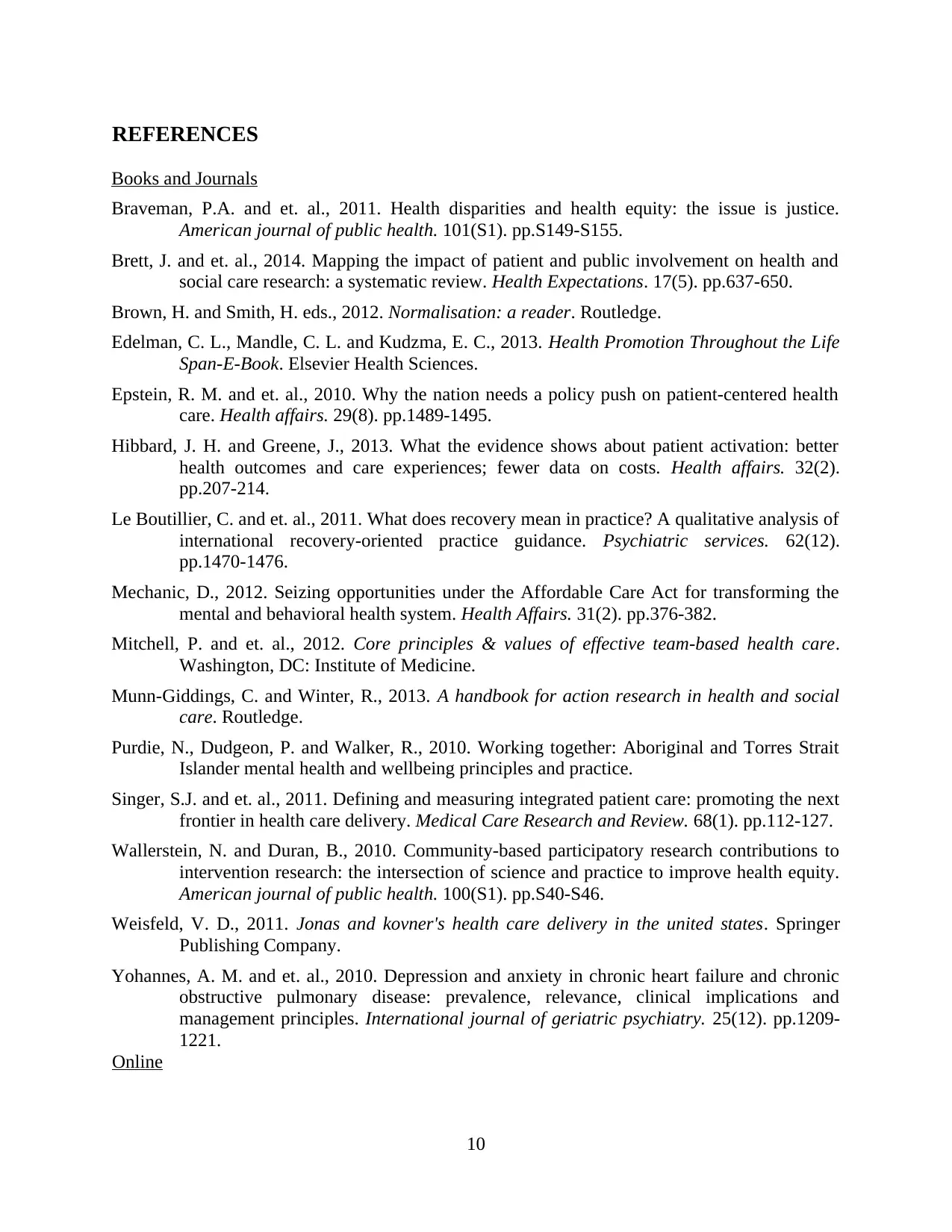
REFERENCES
Books and Journals
Braveman, P.A. and et. al., 2011. Health disparities and health equity: the issue is justice.
American journal of public health. 101(S1). pp.S149-S155.
Brett, J. and et. al., 2014. Mapping the impact of patient and public involvement on health and
social care research: a systematic review. Health Expectations. 17(5). pp.637-650.
Brown, H. and Smith, H. eds., 2012. Normalisation: a reader. Routledge.
Edelman, C. L., Mandle, C. L. and Kudzma, E. C., 2013. Health Promotion Throughout the Life
Span-E-Book. Elsevier Health Sciences.
Epstein, R. M. and et. al., 2010. Why the nation needs a policy push on patient-centered health
care. Health affairs. 29(8). pp.1489-1495.
Hibbard, J. H. and Greene, J., 2013. What the evidence shows about patient activation: better
health outcomes and care experiences; fewer data on costs. Health affairs. 32(2).
pp.207-214.
Le Boutillier, C. and et. al., 2011. What does recovery mean in practice? A qualitative analysis of
international recovery-oriented practice guidance. Psychiatric services. 62(12).
pp.1470-1476.
Mechanic, D., 2012. Seizing opportunities under the Affordable Care Act for transforming the
mental and behavioral health system. Health Affairs. 31(2). pp.376-382.
Mitchell, P. and et. al., 2012. Core principles & values of effective team-based health care.
Washington, DC: Institute of Medicine.
Munn-Giddings, C. and Winter, R., 2013. A handbook for action research in health and social
care. Routledge.
Purdie, N., Dudgeon, P. and Walker, R., 2010. Working together: Aboriginal and Torres Strait
Islander mental health and wellbeing principles and practice.
Singer, S.J. and et. al., 2011. Defining and measuring integrated patient care: promoting the next
frontier in health care delivery. Medical Care Research and Review. 68(1). pp.112-127.
Wallerstein, N. and Duran, B., 2010. Community-based participatory research contributions to
intervention research: the intersection of science and practice to improve health equity.
American journal of public health. 100(S1). pp.S40-S46.
Weisfeld, V. D., 2011. Jonas and kovner's health care delivery in the united states. Springer
Publishing Company.
Yohannes, A. M. and et. al., 2010. Depression and anxiety in chronic heart failure and chronic
obstructive pulmonary disease: prevalence, relevance, clinical implications and
management principles. International journal of geriatric psychiatry. 25(12). pp.1209-
1221.
Online
10
Books and Journals
Braveman, P.A. and et. al., 2011. Health disparities and health equity: the issue is justice.
American journal of public health. 101(S1). pp.S149-S155.
Brett, J. and et. al., 2014. Mapping the impact of patient and public involvement on health and
social care research: a systematic review. Health Expectations. 17(5). pp.637-650.
Brown, H. and Smith, H. eds., 2012. Normalisation: a reader. Routledge.
Edelman, C. L., Mandle, C. L. and Kudzma, E. C., 2013. Health Promotion Throughout the Life
Span-E-Book. Elsevier Health Sciences.
Epstein, R. M. and et. al., 2010. Why the nation needs a policy push on patient-centered health
care. Health affairs. 29(8). pp.1489-1495.
Hibbard, J. H. and Greene, J., 2013. What the evidence shows about patient activation: better
health outcomes and care experiences; fewer data on costs. Health affairs. 32(2).
pp.207-214.
Le Boutillier, C. and et. al., 2011. What does recovery mean in practice? A qualitative analysis of
international recovery-oriented practice guidance. Psychiatric services. 62(12).
pp.1470-1476.
Mechanic, D., 2012. Seizing opportunities under the Affordable Care Act for transforming the
mental and behavioral health system. Health Affairs. 31(2). pp.376-382.
Mitchell, P. and et. al., 2012. Core principles & values of effective team-based health care.
Washington, DC: Institute of Medicine.
Munn-Giddings, C. and Winter, R., 2013. A handbook for action research in health and social
care. Routledge.
Purdie, N., Dudgeon, P. and Walker, R., 2010. Working together: Aboriginal and Torres Strait
Islander mental health and wellbeing principles and practice.
Singer, S.J. and et. al., 2011. Defining and measuring integrated patient care: promoting the next
frontier in health care delivery. Medical Care Research and Review. 68(1). pp.112-127.
Wallerstein, N. and Duran, B., 2010. Community-based participatory research contributions to
intervention research: the intersection of science and practice to improve health equity.
American journal of public health. 100(S1). pp.S40-S46.
Weisfeld, V. D., 2011. Jonas and kovner's health care delivery in the united states. Springer
Publishing Company.
Yohannes, A. M. and et. al., 2010. Depression and anxiety in chronic heart failure and chronic
obstructive pulmonary disease: prevalence, relevance, clinical implications and
management principles. International journal of geriatric psychiatry. 25(12). pp.1209-
1221.
Online
10
⊘ This is a preview!⊘
Do you want full access?
Subscribe today to unlock all pages.

Trusted by 1+ million students worldwide
1 out of 13
Related Documents
Your All-in-One AI-Powered Toolkit for Academic Success.
+13062052269
info@desklib.com
Available 24*7 on WhatsApp / Email
![[object Object]](/_next/static/media/star-bottom.7253800d.svg)
Unlock your academic potential
Copyright © 2020–2026 A2Z Services. All Rights Reserved. Developed and managed by ZUCOL.





